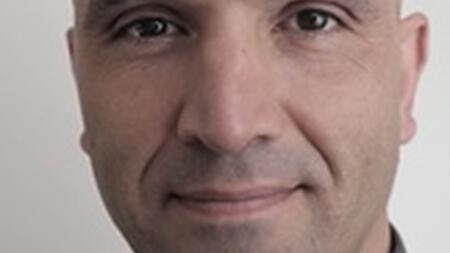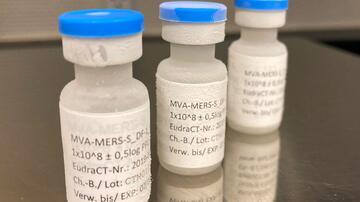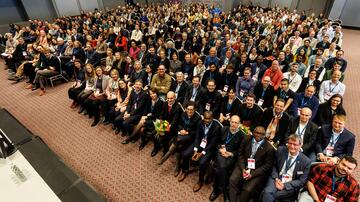“Humanitarian aid is not haphazard work done by over-motivated cowboys”
DZIF infectious disease and tropical medicine specialist Günter Fröschl (42), from Munich, spent two months in Liberia, to help with the largest Ebola epidemic seen to date.
DZIF infectious disease and tropical medicine specialist Günter Fröschl (42), from Munich, spent two months in Liberia from December last year, to help with the largest Ebola epidemic seen to date. Meanwhile, a wave of relief has swept through people on the ground: the last recorded Ebola patient in the country has just been discharged from hospital. However, the epidemic in West Africa is far from over. We spoke to Günter Fröschl about his work in the crisis region:
Which experience from your last project in West Africa are you likely to remember forever?
Quite early on, at the start of my time in Africa, I travelled to the hinterland, into Bong County. International Medical Corps, an American non-governmental organization, has an Ebola treatment unit there where I worked for ten days. There was a little girl there, called Josephine, she was three months old. First, her mother was admitted with Ebola, at which time the baby was still Ebola negative. Her mother survived, despite the low survival rates of about 40 percent seen in such centres at the time. A day after her discharge, she came back to us with her little baby: it now had symptoms and turned out to be Ebola positive. At an age of three months, the chances of survival are inconceivably bad. Luckily, both made it in the end.
After Ebola led to a breakdown of medical care in Liberia in autumn 2014, and the largest hospital in the capital Monrovia was closed, you responded to an appeal by the German Red Cross and volunteered to go and help on the ground. What was your main motivation?
It did, indeed, come about because of the Red Cross appeal, but I had been considering going to help in the field for a longer period of time. I have been working in the humanitarian sector for 13 years, and have gained most of my experience with “Doctors without Borders”, who had signalled early on that they needed someone with my expertise. Initially I declined, because I had just received a new research project and scholarship. When I saw the situation in West Africa increasingly spiralling out of control, I very informally asked my employers if they could possibly release me for a project in Liberia. I immediately got the green light from all sides. It then only took one more phone call and I was part of the team.
How did your environment—your family and friends—react to your decision to go and work in the field?
Of course, my family were initially worried, but I could calm them down quickly because they know me. I have always stressed that my life is important to me and that I will not expose myself to work on missions with uncontrollable risks. The aid work on the ground is professional and very organised, and I certainly do not see myself as a hero who has accomplished superhuman achievements. Working in this setting was simply a little bit unusual.
Did you find the situation in Liberia to be as you had imagined?
Yes, there were no surprises, because I use different surveillance networks to follow what is going on in the world. So I would say that I was quite well informed about the situation on the ground.
Could you outline what Liberia looked like when you arrived there in December?
Luckily, I saw no more dead bodies on the roads. What struck me was how people were behaving, and it impressed me very much. My experiences from earlier travels to African countries were: you arrive and are immediately enveloped in a crowd, with people hugging each other and shaking hands. This time, it was different. The epidemic had taken its effect on people’s behaviour, which was exactly what public information campaigns had aimed for. I am convinced that the decline in case numbers can be significantly attributed to this.
As a medical director, you built up a so-called Ebola treatment unit, an Ebola field hospital, in Monrovia. What does this entail?
In September, the number of Ebola cases was still rising sharply. This was the time when the German Ebola Task Force—consisting of one third German Red Cross and two thirds German Military—decided to take over one of these facilities. Many requirements needed to be fulfilled: sewage and wastewater had to be controlled, incinerators needed to run to specific standards, etc. Our work consisted of establishing management guidelines and training staff, amongst other things. I myself was the treatment unit manager, a similar position to a hospital director who has to coordinate everything. One could say I initially took over a building site.
What does work on such a building site look like?
You have to be very down to earth to get such a project running in the first place. When doctors in Germany ask me if they need an understanding of tropical medicine in order to work on a project like this one in Liberia, I can only say: “No, it is actually unnecessary.” The work is much more about being disciplined, e.g. about handling protective gear: personal safety always comes first. For example: you need to be oriented on the premises and know precisely where the entrances and access routes for patients are located. The most difficult places to assess are the ones where local people, who think they might be infected, come in unchecked. For staff, those Liberians who pose the lowest risk to the facility are those who are known to be ill, because they will be isolated in a tent with other infected patients only.
How did people in Liberia react to your work?
Positively, through and through. Once it became clear who we were and what we do, local people approached us again and again. People thanked us for taking on the risk and for doing the work we do. I believe Liberia has managed to get very good nationwide public support for the measures almost everywhere.
Were you also responsible for informing the public about Ebola and motivating people to go for Ebola screening?
No, this was not our job. Humanitarian aid is not haphazard work done by over-motivated cowboys saying: “We have to do something,” and then somehow do everything. The work there is very coordinated, usually under the umbrella of a United Nations facility. The people managing Ebola treatment units generally do not have anything directly to do with patient contact management or information campaigns. Both of these are much better left in the hands of local people, because you can never be sure that foreigners will find the right words. Additionally, there is a certain mistrust of strangers. Most important are the people who go into the communities and speak to the village elders and try to convince them of their work. Subsequently, the word is spread to the community under the “palaver tree”.
After Christmas, the Ebola case numbers started showing a decline. You consequently developed a new concept for the Ebola Unit. What was it about??
The case numbers had already fallen drastically at the end of December, so over the Christmas holidays, we worked on a concept that would make sensible use of the unit should the case numbers remain consistently low. During the Ebola epidemic, there was a range of other diseases which were no longer being treated properly: malaria, fever, diarrhoea. Everyone was afraid of Ebola lurking behind these symptoms, and hence the entire health system had come to a standstill. We consequently decided to change our original Ebola unit, which was dedicated to treating Ebola patients only, to an extended infectious disease ward. Here we admit people with suspected Ebola and test them. If Ebola is confirmed, we transfer them to one of the existing Ebola treatment units. Patients with negative results twice in succession can then be treated in our unit under reduced protection measures.
You also worked in Africa in the past, for example in “Doctors without Borders” projects. Which previous experiences helped you with your last project?
Intercultural competency is pivotal. You have to know in advance that you cannot expect to arrive in Africa as a “German machine” and organise everything “zack, zack, zack”. It is important to have a certain feel for people—especially if you are in a leading position. You also have to be realistic, to a certain degree, about what is possible and what is not. There will always be difficulties, e.g. with logistics or cold chains. It is important not to get carried away by this.
In your opinion, which measures are particularly effective in the fight against Ebola?
People’s behaviour is certainly the most important aspect required to curb an epidemic like Ebola. You need an informed public in order to achieve this. The problem is not only avoiding infections, but also ensuring that survivors are reintegrated into their communities. You can provide the best facilities: if the public is not on your side, every other activity is a lost cause.
Info box
Günter Fröschl holds a DZIF Clinical Leave Programme scholarship. He has been released from his clinical duties until the end of April, permitting him to dedicate himself fully to laboratory research with Prof Ulrike Protzer at the Department of Virology at the TU Munich—he has already applied for an extension. The research involves hepatitis B in relationship to HIV co-infections. He is analysing immune responses with a Bonn cohort and samples from Tanzania. Being a “Munich child”, born on the “right-hand side of the Isar”, more or less with a view of his current workplace, he studied medicine from 1993 to 2000 at the TUM. He has been a member of Doctors without Borders since 2002. He completed his specialty in internal medicine with the additional qualification “Tropical medicine and Infectology”. Besides this, he has had a lot of work experience abroad: he has worked in Africa and Southeast Asia. He has been working at the Munich Institute of Tropical Diseases since 2009.




